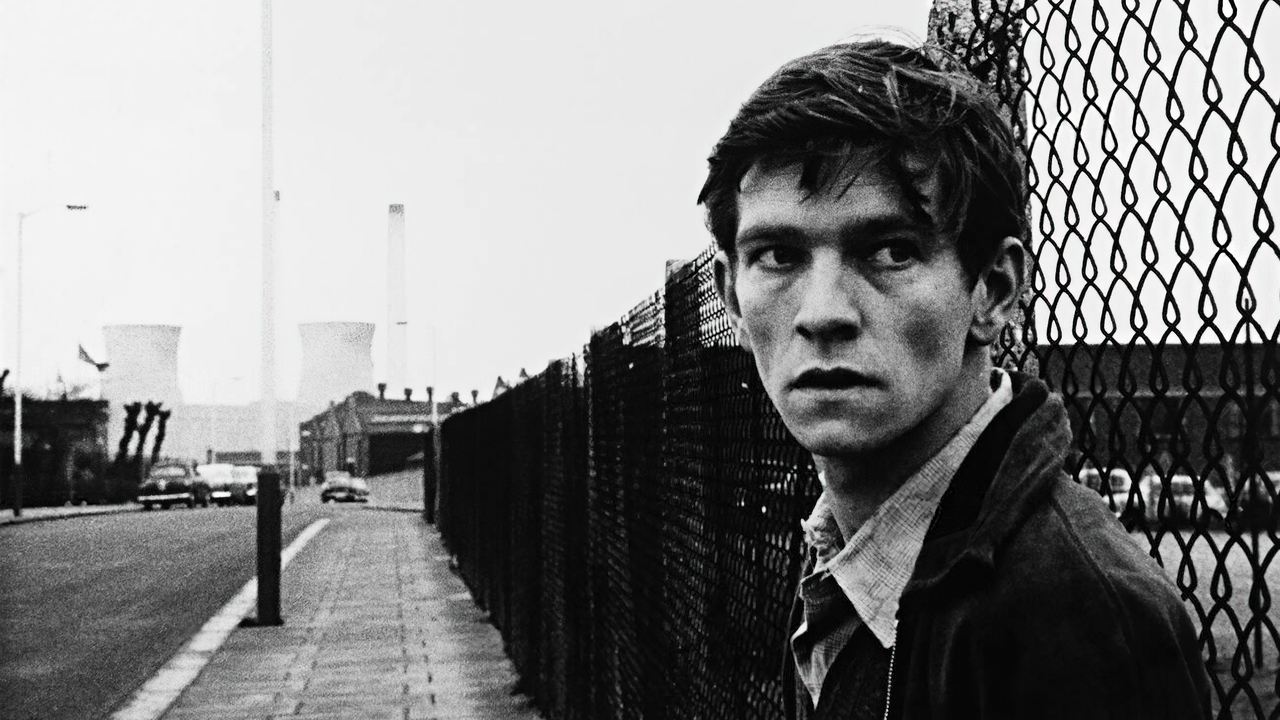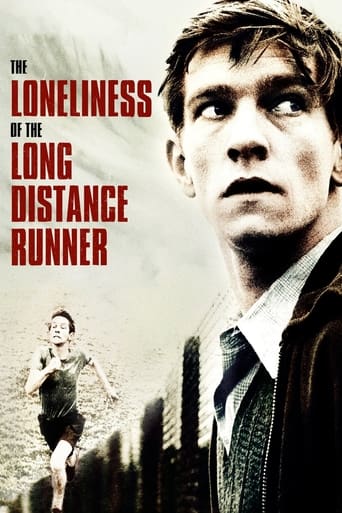

Good idea lost in the noise
... View MoreYour blood may run cold, but you now find yourself pinioned to the story.
... View MoreEasily the biggest piece of Right wing non sense propaganda I ever saw.
... View MoreOne of the most extraordinary films you will see this year. Take that as you want.
... View MoreAlan Sillitoe seems to have gone down in literary history as a two-hit wonder, the two hits being his first two works, the novel "Saturday Night and Sunday Morning" and the short-story collection, "The Loneliness of the Long Distance Runner". Few, if any, of his later works achieved the same success. In the late fifties and early sixties, however, he was a leading light in what became known as the "kitchen sink" social-realist movement in English literature, and both books became key texts of that movement. The British cinema was going through a similar social-realist phase at around the same time, so (like several other key kitchen-sink texts, such as Shelagh Delaney's "A Taste of Honey" and Stan Barstow's "A Kind of Loving") both "Saturday Night..." and "The Loneliness..." were inevitably adapted for the screen. "The Loneliness..." tells the story of Colin Smith, a youth from a working-class Nottingham family, who is sentenced to a term in borstal for burgling a bakery. (A "borstal" at this period was a special prison for young offenders). In the original short story he was simply called "Smith", but Sillitoe, who also wrote the screenplay, evidently felt that he needed a Christian name for the screen. The film is essentially a study of class conflicts in the Britain of the late 1950s and early 1960s. The two main characters are Colin and the Governor of the borstal. The Governor is, on the surface at least, a humane and decent man. He claims that his job is to reform and rehabilitate the young men in his charge rather than to punish them. The Governor's ambition is to run his borstal along the lines of a public school. (His accent suggests that he is probably a public schoolboy himself). He is keen to encourage his boys to take up sport as part of his rehabilitation programme, and Colin becomes a protégé of his when he discovers that the young man is a talented athlete. Colin is entered into a cross-country race in an athletics meeting against the boys of a nearby public school. The account of Colin's time in the borstal is intercut with a series of flashbacks showing his previous life in Nottingham. An event which had a great effect on him was the death of his father, not because he had any great affection for the old man but because he saw him as a symbol of the downtrodden, put-upon working-class little man. From what we learn, Smith senior appears to have worked all his life in a badly-paid dead-end factory job, with little to show for his hard work. He was badly treated by his bosses and cuckolded by his sluttish, sharp-tongued wife who moved one of her lovers into the family home almost as soon as he was dead. (Colin may have had no great affection for his father, but he positively detests his mother). Colin's resentment of "the System" may derive from a determination not to allow himself to be trapped in the same way as his father was. I have always been in two minds about Colin's famous final act of rebellion, but then I think that Sillitoe deliberately intended it to be ambiguous. On the one hand, some have seen it as a magnificent revolt against the System and against the Governor and his old-school-tie Establishment values. Others, however, have seen it as a pointless gesture by a young man who actively wants to be a loser because he is too cowardly, or too apathetic, to be anything else. I think that Sillitoe also wanted us to be in two minds about Colin himself. For all his talk of working-class solidarity, he is actually very self-centred. He can talk the language of "them and us" when what he really means is "them and me". When he robs the bakery he gives no thought to the workers whose wages he is stealing; his only thought is to spend the proceeds on a trip to Skegness with his partner-in-crime and their girlfriends. The alacrity with which the police make him their Number One suspect, even when they have no hard evidence against him, suggests that this is far from being his first brush with the law. Sillitoe himself had left-wing sympathies, as did the director Tony Richardson, but he may have intended Colin as a portrayal of the "phoney radical" who uses the language of political protest in order to justify his own selfishness and criminality. I think that we are also supposed to see the Governor as an ambiguous figure. On the surface he may seem decent, but it is implied that beneath this surface veneer he is less humane than he seems and that he turns a blind eye to brutality carried out by his officers against the inmates. He talks about his concern for his charges, but we suspect that he may only care about a favoured few, especially those who share his interest in sport. If Colin is a phoney radical, the Governor is a phoney liberal. There are two fine performances, one from that pillar of the British theatrical Establishment Sir Michael Redgrave as the Governor, a pillar of the British penal Establishment, and the other from Tom Courtenay, one of the emerging Angry Young Actors of the early sixties, as the angry young Colin. The contrast between their two very different styles of acting- Redgrave superficially gentlemanly and urbane, Courtenay feral and aggressive- symbolises the clash of social classes and of values which lies at the heart of this fine film. 8/10
... View MoreAfter committing a crime with a friend, the young rebel Colin Smith is sent of to a reform school called Ruxton Towers where he is introduced to a world that is totally different from his own. Colin immediately objects to the reform school's methods and considers his punishment as pointless, but when he meets the school governor, a man who believes that sports can transform young men into responsible citizens, Colin gets the opportunity to use his running skills.The fifth feature film by British New Wave director Tony Richardson (1928-1991) is a socially critical story based on a short story from 1959 by English writer Alan Sillitoe (1928-2010), which realistically depicts the working-class milieu in Nottingham during the early 1960s. This character-driven social drama opens with the main character running along a road while his inner monologue describes his intelligible view of life, and from there on out portrays an in-depth study of character about a man's unyielding integrity. Through flashback scenes the viewers get a close insight into the protagonist's life before the reform school and acutely narrates how he is challenged by his resistance against authorities and his troubled family life while trying to find his own identity.This empathic coming-of-age tale has a well-written screenplay by Alan Sillitoe which examines themes like identity, family relations, friendship, alienation and strength of character. The captivating music and the stellar black-and-white cinematography emphasizes the quiet atmosphere in this British independent film, a timeless character drama, which is crafted by Tom Courtenay's magnificent performance.
... View MoreWhat a great find off YouTube this was. Adapted by Alan Silitoe from a short story.Colin Smith (Tom Courtney) has been sent to a Borstal. He's not feeling remorseful for the petty pinching "wrong" he did: "I got caught – I didn't run fast enough".Turns out he's probably gonna be on the run, running away, all his life. But he seems to like running, is born to run – and he runs fast; "All i know is you've got to run, run without knowing why" We get flashbacks to his "previous" life, all run-of-the-mill working class delinquent stuff: pinching a car with mate Mike (James Bolam); picking up a couple of birds, going off on a joy ride. Dreams of going down to London. A quick snog with the birds. Return car. A couple of mischievous misfits – harmless really.Back we go to the Remand Centre for naughty boys where Smith can turn himself into a good boy if he wins the Cup for The Governor; only he won't allow himself to be corrupted by a non-working class, institutionalised, poncey, version of being good: "I'm gonna let them think they've got me house-trained. But they never will – the bastards". Another version of Arthur Seaton's "Don't let the bastards grind you down" is Colin Smith.Flashbacks to back story: Dad dies. With £500 cash pay-out mother is going on a shopping spree, buys a telly. Colin is not impressed. He burns the (blood) money she gives him. Those birds are picked up again, taken to Skeggy, snogged a bit, fallen in love with a bit. He's confessing to his bird Audrey (Topsy Jane) this sad realisation: "I run away to try and get lost. I was always trying to get lost when i was a kid.I soon found out that you can't get lost though".And then he's done a burglary with Mike and unwisely stuffed the cash up a drainpipe: "Whats the first thing you'd do if you won £75,000 quid? asks Mike" "Count it" comes the droll reply. Yeah, count it, make sure you know how much you've got even if you've got no idea what you'd do with how much you've got. Mike asks, "What do you want to do Col?" "I don't know. Live i suppose. See what happens" says Colin. Hasn't got a clue what to do with his hopeless life has Colin Smith. Except keep running fast, running off, running away.And running free. Which the Governor has allowed Colin to do: run unsupervised outside the perimeter fence. Trusts him. Cus he's "the Governors blue-eyed boy now" isn't he? No he's not. He's not been "had". He's gonna want to lose that race surely. I was ambivalent watching him run it (which i suppose is what i was meant to be feeling) I wanted him to lose the Cup (for The Governor). But i didn't want him to lose the race (for himself) And in the end he didn't lose. Or did he? Well, he hadn't lost his self-respect.And he'd won.At being a loser.Which is frequently where you can find all your slowed down "thievin little bastards" like Colin Smith.
... View MoreThis is class angst at it's best. A story about a young man "gone bad" and the failed efforts to rehabilitate him. Sure, there are events in his life that may be extreme, but not too much to be unbelievable. This is a Dickens story without the fancy language. The lead character, Colin Smith (played expertly by Tom Courtenay), is from the British working class of the early 60's. What he sees around him is not only the distance from the more affable middle class, to whom the culture of commercialism makes sense, but it's emptiness as well. Sent to a reform school that professes rehabilitation through hard work, Colin continues to make the same assessments of power that he did when free. He reflects Brando's response to "What are you rebelling against?" (Answer "What have you got?") in a more vulnerable and convincing way. The manner in which his head schoolmaster (played by Michael Redgrave) seems more to be talking to himself than to Colin is all too accurate. This is a story about assimilation and it's obstacles.Some may find the running metaphor to be a bit much, but to those who understand the pressure to stay true to their roots and the consequences of that loyalty, this movie is a painful reminder that allegiances made are not easily left behind.
... View More